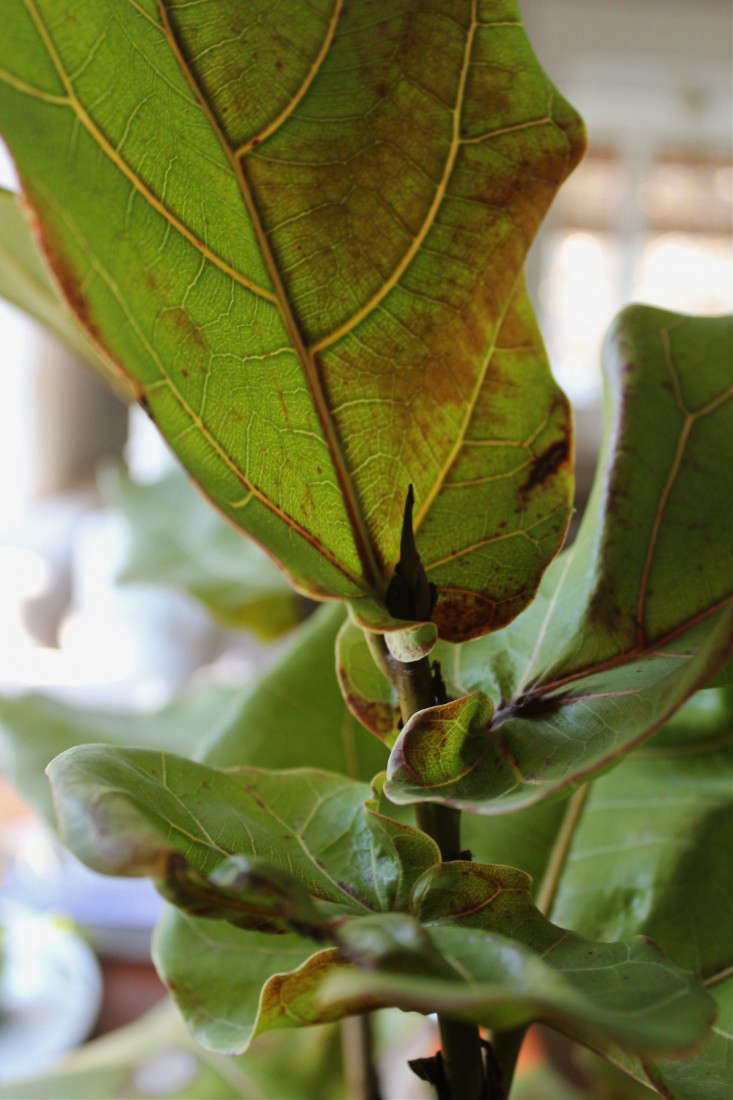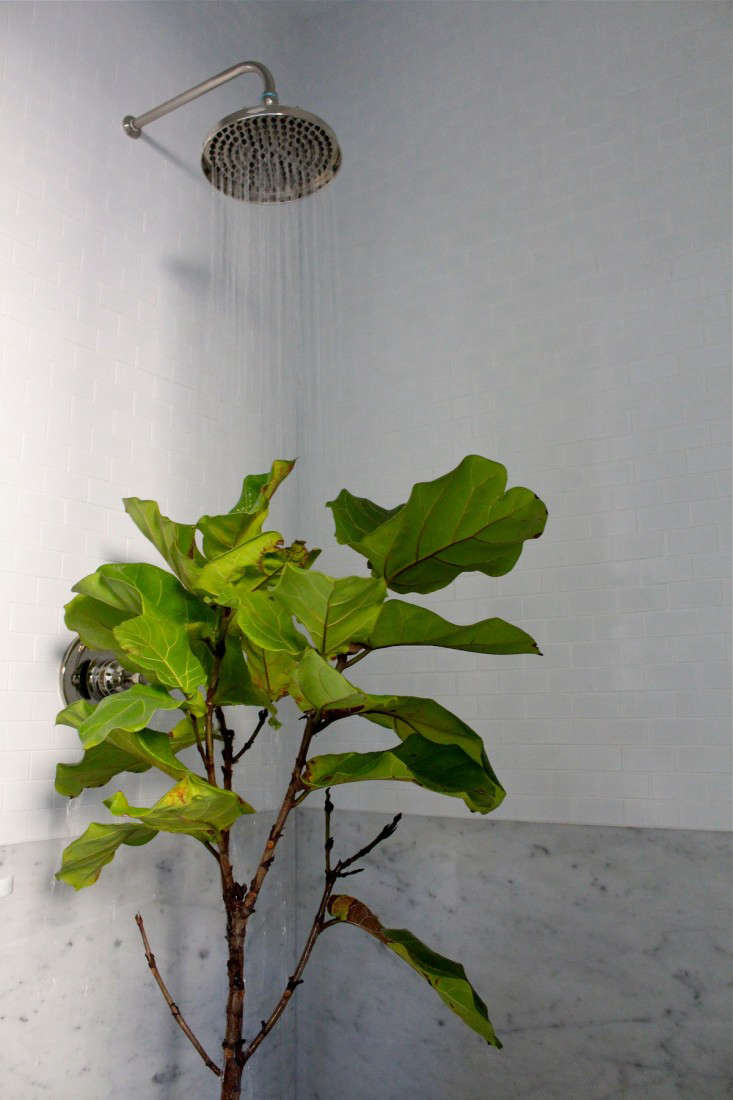I suppose it is a good thing that houseplants don’t have hands because it means they can’t type. Otherwise my fiddle-leaf fig tree would be writing a post for its blog right now, begging for help: “Get me out of here, she’s trying to kill me.” As it is, the tree is looking at me accusingly as it drops yet another browned and dried leaf onto the floor. Can this dying plant be saved?
Maybe I should explain how the fig and I got into this desperate situation. A few months ago I fell in love with a four-foot fiddle-leaf fig tree at Green Jeans Garden Supply in Mill Valley, California, my favorite local plant store, brought it home on a whim, and vowed to care for it properly. I did everything I could think of to please this West African lowlands native: I found it a nice spot in indirect sun; let its soil dry out between waterings, and kept it in a tight pot so the roots wouldn’t, in the words of Green Jeans owner Kevin Sadlier, “get freaked out.”
Maybe this should have been the first clue that a needy houseplant was not the best fit for a negligent household where the Tillandsias have been known to resort to crawling to the sink to turn on the faucet themselves after a few weeks without water.
But everything went well for…oh, about four months. We gave the plant a nickname, bought Precious its own rolling plant stand, and invited its little houseplant friends over for play dates so it wouldn’t get lonely (or “freaked out”). On sunny afternoons I even rolled the fiddle-leaf fig tree out to the covered front porch so it could wave to neighbors walking by.
But then? One night the unthinkable happened here in northern California. We had a freeze, and the temperature dipped below 30 degrees. The next morning, I sat up in bed and suddenly remembered: Precious was outdoors all night!
The rest of the story is sad. I brought the fiddle-leaf fig indoors, but almost immediately its leaves started to turn brown–one by one. And all the new buds that had been furled tightly at the base of mature leaves shriveled and turned crispy. Like, a black crispy. Not good. And now, a month later, the plant is looking sicker by the day. Finally in desperation, this week I went back to Green Jeans and asked, Is it too late? Or can my dying fiddle-leaf fig tree be saved?
Good news: Read on for seven strategies for reviving a fiddle-leaf fig tree.
Photography by Michelle Slatalla.

Secret No. 1: Don’t prune the brown, bare branches unless they look moldy. If you see any brown husks, leave them alone too—the hard covers could be protecting new growth. Come spring, leaves will sprout.
(To be fair, there’s nothing prettier than a healthy fiddle-leaf fig tree. See 5 Glamorous Fiddle-Leaf Fig Trees.)

Secret No. 2: Be patient. The fiddle-leaf fig tree is a slow grower; in winter it goes dormant. Don’t expect to see any improvement before April (and warmer temperatures). And don’t expect immediate miracles even then. It could be a year before a recovering fiddle-leaf fig tree starts to look really good again.
Secret No. 3: If the stalk is shriveled, it’s too far gone to save. But if it’s still hard and strong, it can recover. Again, give it time.

Secret No. 4: Don’t pull off leaves. But you can trim away brown outer edges without harming the plant.

Secret No. 5: Identify the areas on the stalk where there are damaged buds; don’t pull off the hurt tips, but keep an eye on these areas. This is where you can expect to see new growth.
Looking for a low-maintenance houseplant? See 5 Houseplants to Simplify Your Life.

Secret No. 6: Don’t let an ailing fiddle-leaf fig tree dry out completely. Water it once a week or so and make sure excess water drains out the bottom of the pot. (I water mine in the shower and leave it there for a few hours to let the pot drain before returning it to its plant saucer.)
Secret No. 7: Don’t transplant it until you see new growth even if the pot is so tight that roots are visible at the surface.
In summary, the best thing you can do to help your fiddle-leaf fig tree survive is to leave it be to recover, slowly, on its own. Give it indirect sunlight, water once a week, and warm temperatures (it will appreciate a room temperature that’s from 60 to 90 degrees). And certainly–don’t leave it outdoors overnight if there is any chance of the temperature dropping below freezing.
Are you trying to keep your fiddle-leaf fig alive too? See more tips in The Fig and I: 10 Tips for Caring for a Fiddle-Leaf Fig. And see more tips for growing, care, and design at Fiddle-Leaf Fig Trees: A Field Guide in our curated plant guide for Tropicals 101.
Finally, get more ideas on how to successfully plant, grow, and care for a creeping fig with our Creeping Fig: A Field Guide.
Additionally, get more ideas on how to successfully plant, grow, and care for fiddle-leaf fig tree with our Fiddle-Leaf Fig Tree: A Field Guide.
Finally, get more ideas on how to plant, grow, and care for various houseplants with our Houseplants: A Field Guide.
Interested in other tropical plants for your garden or indoor space? Get more ideas on how to plant, grow, and care for various tropical plants with our Tropical Plants: A Field Guide.
Finally, get more ideas on how to plant, grow, and care for various vines and climbers with our Vines & Climbers: A Field Guide.













Have a Question or Comment About This Post?
Join the conversation (28)